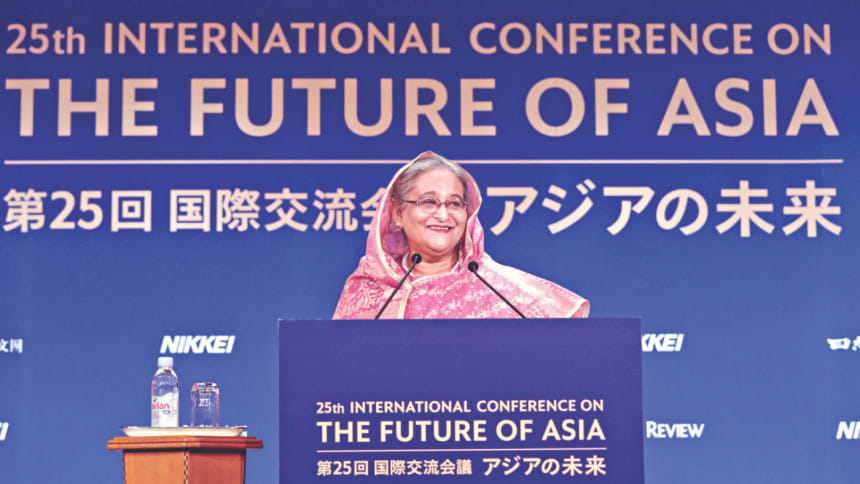Rohingya crisis a lesson for world

Prime Minister Sheikh Hasina has said the Rohingya crisis is a lesson for other situations of crises in the region and elsewhere in the world to overcome chaos with the power of peace, humanity and development.
“We have sought dialogue and consensus over discord, even in the face of extreme provocation and crisis. We are not only responding to a humanitarian call, but we’re also aware about not allowing the crisis to escalate into chaos and regional instability,” she said.
The PM was delivering her keynote speech at the 25th International Nikkei Conference on Future of Asia at Imperial Hotel here yesterday with the theme “Seeking a New Global order - Overcoming the Chaos”.
Hasina said despite having extreme limitations, Bangladesh offered shelter to over 1.1 million forcibly displaced Rohingyas as a responsible nation.
“The future of the world lies in convergence of interests common to humanity. As a member of the global community, Bangladesh will continue to work with all friends and partners to ensure a stable and sustainable world order for our future generations.”
The PM shared some of her ideas with the Asian leaders to make a better Asia.
“Today’s world is confronted with challenges and conflicts in many ways. We need to pledge to strengthen the world with greater openness, jointly address global challenges, safeguard fairness and justice and inject new impetus to cooperate using innovative ideas and measures.”
Economies should take innovative practices surpassing alliances, Hasina said, adding that partnerships need to build on mutual trust and respect, common development and prosperity for a win-win strategy and to the benefit of people.
She said Asian countries need to cooperate with each other in the spirit of openness, inclusiveness, equality, sharing benefits and joint contributions.
Asia’s future would depend on sustainable and balanced development, improving international order and establishing win-win international relations, the PM observed.
Mentioning that human civilisations flourished despite having suffered the horrors of war and the scourges of nature, the premier said she was confident that the daunting challenges confronting human civilisations would ultimately produce a positive outcome through strong, rational and responsible leadership and through partnerships among nations.
In this regard, she firmly said the power of humanity and positive forces is bound to prevail. “The global community is looking up to us, the rising Asia, to innovate, aspire, and lead the world towards continued peace and prosperity.”
Hasina said despite positive experience, the growing trend of trade protectionism has been seen in recent years. On the other hand, Asia has long been in support of liberalising trade and investment. Forthright, the protectionist move from many countries may eventually lead to a worldwide trade tension.
“It’s a simple economics that tariff rise will cause decline in GDP growth.”
The PM hoped that the Nikkei Forum would suggest how to strengthen the cooperation between the Asian countries and how to deal with protectionism within multilateral trading regime.
Putting emphasis on UN system and multilateralism, she said, “Our emphasis has always been to promote peace and progress that would directly benefit people. In a multi-polar world, we would strive to strengthen the UN system and multilateralism for all countries.”
Increasing close interdependence among economies in Asia and beyond would add further wealth to the economies and societies. Cross-border movement of goods and people cause exchange of a wide range of knowledge and experience and ideas, Hasina told the programme.
“It is the dynamism of connectivity that forms the cornerstone for peace and prosperity around the world. Infrastructure, free trade and liberal investment give foundation to Asian development.”
The premier said the unprecedented levels of wealth and opportunity, rising life expectancy, greater access to education, falling infant mortality and reductions in absolute poverty have been witnessed in recent years.
Laying emphasis on facing development challenges collectively, Hasina said, “We may pool together as a group to boost world peace and stability, promote a multi-polar world and protect legitimate rights and interests of developing countries.”
Terming private sector the main engine of Bangladesh’s economy, she said her government attaches utmost priority to private entrepreneurship and investments, both domestic and foreign.
She said Bangladesh has one of the most liberal foreign investment regimes in South Asia, which includes legal protection of foreign investment, generous tax policy schemes and concessionary duty on import of machinery.
“We also offer 100 percent foreign equity, unrestricted and full repatriation of dividend and capital on exit. We enjoy preferential access to most of the leading world markets, including the EU, Canada, and Japan. All these generate significant incentive for global investors, and we’re witnessing growing interest from foreign investors,” she said.
During the question-answer session, Hasina said Bangladesh would welcome any ideas of investment in any sector by the Japanese investors.
The Nikkei Conference was also joined by Malaysian Prime Minister Mahathir Mohamad, Cambodian premier Hun Sen and Philippines President Rodrigo Duterte.

 For all latest news, follow The Daily Star's Google News channel.
For all latest news, follow The Daily Star's Google News channel. 



Comments